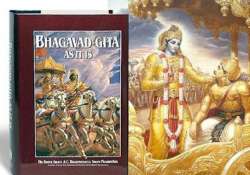Prosecutor Asks Court To Remove Russian Commentary Of Bhagvad Gita
Moscow, Feb 17 : Nearly two months after a Russian court rejected a ban on a translated version of Bhagvad Gita, a top Siberian prosecutor has now demanded the removal of a Russian comment only

Moscow, Feb 17 : Nearly two months after a Russian court rejected a ban on a translated version of Bhagvad Gita, a top Siberian prosecutor has now demanded the removal of a Russian comment only from the book for being “extremist”, without affecting the canonical text of the scripture.
First Deputy Prosecutor General Alexander Buksman told journalists on Thursday that people misunderstand the prosecutor's office's claim to declare the Russian version of “Bhagavad Gita: As It Is” an extremist text.
“The bid to ban the Russian translation of Bhagavad Gita has been misunderstood,” Buksman said, adding that the prosecutors office seeks only to ban the book commentary rather than its text.
On December 28, a court in the Siberian city of Tomsk had rejected a petition seeking a ban on the translated version of Bhagvad Gita, a verdict which was welcomed by India as a “sensible resolution of a sensitive issue”.
Tomsk Region Prosecutor General Vasily Voikin has now demanded that “a Russian translation of a comment in this book, earlier published in English, be banned as extremist, not the canonical text of the scripture,” his deputy Ivan Semchishin was quoted as saying by ‘Ria Novosti' today.
“That is why the prosecutor now has to stand up for his position in the appellate court,” Semchishin said. Confirming the report, Sadhu Priya Das of Moscow ISKCON told PTI that an appeal has been filed by prosecutors in Tomsk District court against the earlier judgement, dismissing their plea to ban Gita.
“The next hearing will be held on March 6,” he told PTI. The original petition seeking a ban on the translated version of the holy scripture was filed in June 2011 and the trial prompted a flurry of criticism from across the world.
State prosecutors, who had filed the petition, have branded the test as “extremist” literature full of hatred and insult to non-believers, which promoted social discord. A day before the Siberian court rejected the petition, External Affairs Minister S M Krishna had asked the Russian government to help resolve the issue quickly. “It's important to discern gems from the chatter in this very case; the society's perception of this issue is that prosecutors are standing against the concepts of this religion (Hinduism), Buksman said.
“However, the problem is that the Russian translation has paragraphs that could be seen as promoting extremism; prosecutors started the case for that reason,” he added. Voikin “is now maintaining his claims in an appeal court for that very reason,” Semchishin added. Bhagavat Gita was first published in Russia in 1788 and since then it has been republished many times in various translations.
The controversial Russian translation of “Bhagavad Gita: As It Is” was carried out by founder of the International Society for Krishna Consciousness (ISKCON) A C Bhaktivedanta Swami Prabhupada.The book was translated into more than 60 languages.
Foreign Ministry spokesman Alexander Lukashevich said the translated version may be linguistically untrue to the original Hindu scripture, as it contains “semantic distortions,” which may affect its meaning.